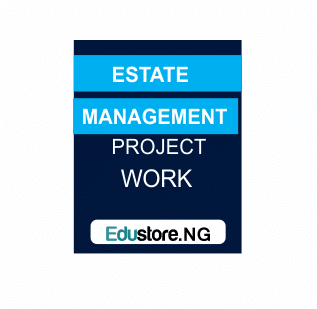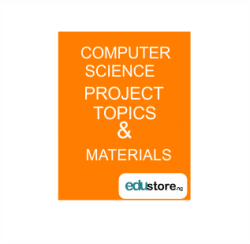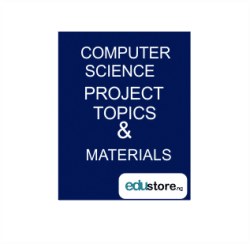A Study of ICT in the Real Estate Industry
ABSTRACT
Estate Surveying and Valuation is one of the professions in the built environment that requires the use and application of Information and Communication Technology (ICT) in the various areas of its practice. Such ICT devices and applications include computers, networks, hardware, software, satellite and so on. This study sets to examine the extent to which Estate Surveyors and Values apply ICT in performing their professional tasks so as to assess its contribution to their practice. A well-structured questionnaire will be administered to Estate Surveyors and Valuers practicing in Abeokuta both in public and private practice in Ogun State.
CHAPTER ONE
1.0 INTRODUCTION
1.1 BACKGROUND OF THE STUDY
The profession of estate surveying and valuation was given the official recognition in Nigeria in 1974 via Decree No. 24 1974. The Decree defines the profession of Estate Surveying and Valuation as those engaging in the arts, science and practice of:
- Determining the value of all description of property, and of the various interests therein.
- Managing and developing estate; and other business concerned with the management of landed property
- Securing the optimal use of land and its associated resources to meet social and economic needs
- Determining the structure and condition of buildings and their services and advising on their maintenance, alteration and improvement
- Determining the economic use of resources by means of financial appraisal for the building industry
- Selling (whether by auction or otherwise), buying or letting as agent, real or personal property or any interest therein
It is therefore common to see estate surveyors and valuers providing professional service in the areas of property valuation, property management, property rating and taxation, building construction, property development, building maintenance, facilities management, land titling and recording, land use and management and son.
However, if the members of the are to perform creditably in performing the above stated functions, it has to react and respond to the different issues emanating from global phenomenon such as globalization, commercialization, information and communication technology (ICT) to mention but a few.
ICT is described as shorthand for the computers, software, networks, satellite links and related system that allows people to access, analyse, create, exchange and use data electronically. Its importance is overwhelming and its usage increasing daily. Today’s world is a world of information explosion. This information explosion is taking place in such a fast speed that even a literate person is feeling as if he or she is illiterate being not able to cope up with such an information explosion. ICT has built long term skills and research expertise knowledge for the undergraduate and post-graduate education, academics and researchers. The Authors opined further that many companies have now relied solely on ICT to advertise their products, place classified on-line service and create job opportunities platform. Modern society is characterized by sudden growth and development of information and communication technology (ICT) resulting in large dependence of the society, in a wider sense, on the individual knowledge and competence of a person in the IT area.
This implies that any professional that wants to move along with the demands of the globalised world should as a matter of fact get himself armed with various tools of ICT. It is in the light of the above that the study examines the impact on the use of information and communication technologies (ICT) in the practice of Estate Surveying and Valuation using Abeokuta as a case study.
1.2 STATEMENT OF PROBLEM
The real estate industry with its diverse activities has also been seen participating in this new trend; but with diverse responses from practitioners. In Nigeria, the adoption of information technology for real estate transactions began with property website where property information was published; however challenges such as failure of the sites to effectively meet the customer’s need, unfulfilled promises on services, links to pages that are non-functional or nonexistent, has discredited this medium before their clients (Chukwuemeka, 2012). Myriad social networks are readily available online and are being explored when renting or buying apartments. Sawyer, Croston, Wignand and Allbritton (2003) had envisaged that the residential agents whose job is to serve as intermediaries connecting buyers and sellers, may have their job threatened with the advent of ICT which has provided buyers and sellers a new way of finding one another.
1.3 AIM AND OBJECTIVES
This study is aimed at examining the use of Information and Communication Technologies (ICT) in the practice of Estate Surveying and Valuation with particular reference to Abeokuta, Ogun State. The specific objectives are;
- To examine the extent to which Estate Surveyors and Valuers apply ICT in performing their professional tasks in the study area
- To assess the contribution of ICT to real estate practice in the study area
- To examine the constraints associated to the use of ICT to expand the practice of Estate Surveying and Valuation in the study area
1.4 RESEARCH METHODOLOGY
The information of this research work shall be collected through the sources of data which are primary and secondary data. The secondary source was collected from available literature and past work on the subject which include published and unpublished materials like textbooks paper delivered during seminars and other relevant publications. Primary data will be gathered through administering questionnaire , all data gather shall be analysed through simple statistical made by converting the frequency into percentage.
1.5 SIGNIFICANCE OF THE STUDY
It shall be of great benefit to the Nigerian Institution of Estate Surveyors and Valuers (NIESV) in understanding the major bottlenecks associated with the use of ICT tools.
Students and researchers will find this study useful as it will serve as pedestal on which the success of their further research would stand.
Meanwhile, this study thus seeks to fill this gap that exists in literature and also contribute immensely to the existing body of literature regarding the area of intangible assets valuation in Nigeria.
1.6 LIMITATION TO STUDY
In a study of this nature, one is bound to encounter series of problems in getting the required data that will meet up with the expected standard of course, the research include the use of both the primary and secondary data and however, there were some problem encountered. These include financial and time constraints. Other notable problems that cannot over employed include high cost of transportation incurred while collection of data.
1.7 SCOPE OF THE STUDY
The study shall be restricted to Abeokuta metropolis only. This is to enable easy management of data generated for thorough analysis and inferences. Metropolitan Abeokuta is the economic nerve Centre of the Ogun State .This limitation is however influenced by the researcher’s initial discussion with professional Estate Surveyors and Valuers in the study area.
1.8 DEFINITION OF RELEVANT TERMS
1.8.1 INFORMATION AND COMMUNICATION TECHNOLOGY: Information and communications technology (ICT) is an extended term for information technology (IT) which stresses the role of unified communications and the integration of telecommunications (telephone lines and wireless signals), computers as well as necessary enterprise software, middleware, storage, and audio-visual systems, which enable users to access, store, transmit, and manipulate information.
The term ICT is also used to refer to the convergence of audio-visual and telephone networks with computer networks through a single cabling or link system. There are large economic incentives (huge cost savings due to elimination of the telephone network) to merge the telephone network with the computer network system using a single unified system of cabling, signal distribution and management.
However, ICT has no universal definition, as “the concepts, methods and applications involved in ICT are constantly evolving on an almost daily basis.”[3] The broadness of ICT covers any product that will store, retrieve, manipulate, transmit or receive information electronically in a digital form, e.g. personal computers, digital television, email, robots. For clarity, Zuppo provided an ICT hierarchy where all levels of the hierarchy “contain some degree of commonality in that they are related to technologies that facilitate the transfer of information and various types of electronically mediated communications.”. Skills Framework for the Information Age is one of many models for describing and managing competencies for ICT professionals for the 21st century.
Order For Complete Work Now
DOWNLOAD COMPLETE WORK- For Reference Only: Materials are for research, citation, and idea generation purposes and not for submission as your original final year project work.
- Avoid Plagiarism: Do not copy or submit this content as your own project. Doing so may result in academic consequences.
- Use as a Framework: This complete project research material should guide the development of your own final year project work.
- Academic Access: This platform is designed to reduce the stress of visiting school libraries by providing easy access to research materials.
- Institutional Support: Tertiary institutions encourage the review of previous academic works such as journals and theses.
- Open Education: The site is maintained through paid subscriptions to continue offering open access educational resources.






